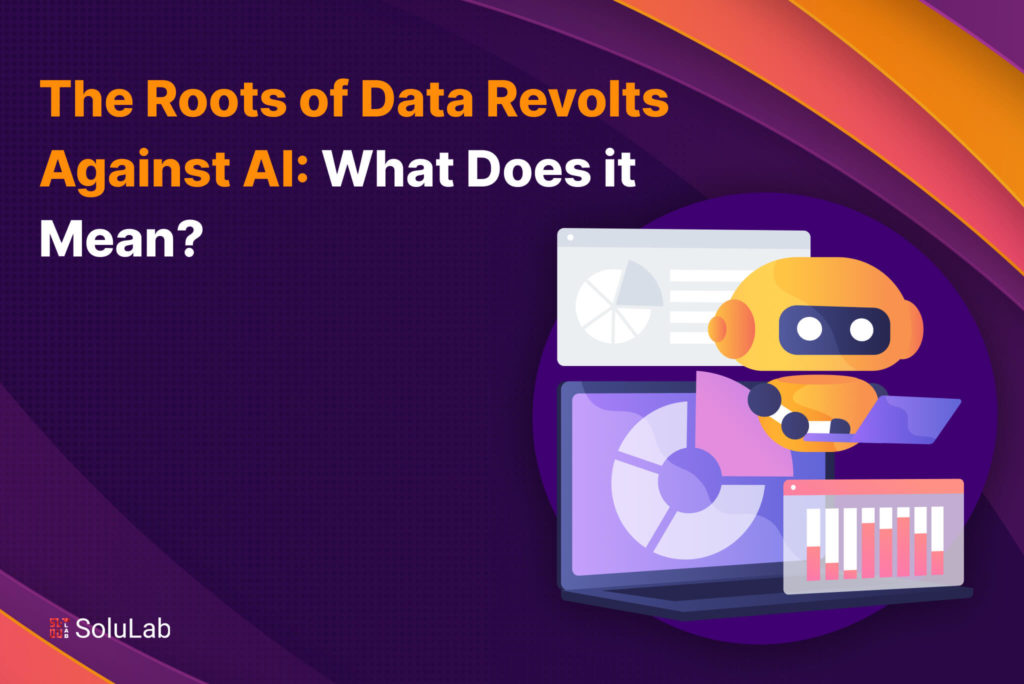
In the rapidly changing digital landscape, the growth of Artificial Intelligence (AI) has been nothing short of remarkable. From AI-powered chatbots revolutionizing customer service to the top AI solution companies pioneering cutting-edge innovations, the impact of AI is undeniable. However, this journey has not been without its challenges. The rise of AI has also sparked discussions about the ethical implications and responsible integration of this technology. This blog will delve into the nuances of the AI revolution, exploring the role of various AI-related entities and their impact on the digital ecosystem.
The Rise of Artificial Intelligence
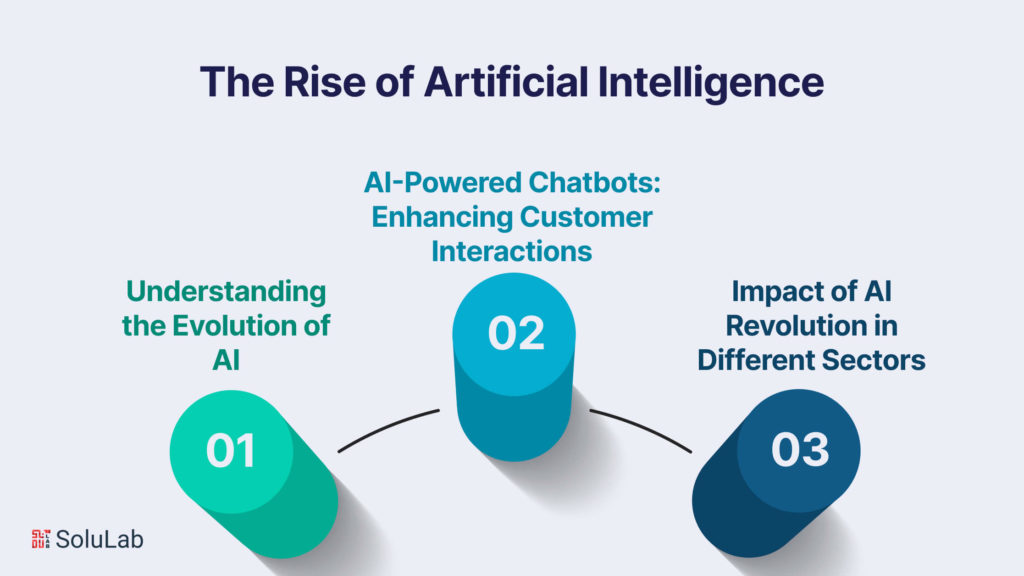
Artificial Intelligence (AI) has become an integral part of the modern technological landscape, revolutionizing the way businesses operate and transforming various industries. This section provides insights into the evolution of AI, its impact on customer interactions through AI-powered chatbots, and the transformative role it plays across different sectors.
-
Understanding the Evolution of AI
Artificial Intelligence (AI) has undergone significant evolution, from its early stages of rule-based systems to the complex deep learning models of today. This evolution has been driven by advancements in computing power, data availability, and algorithmic innovations. The initial stages of AI development focused on basic tasks such as decision-making and problem-solving. However, with the introduction of machine learning and neural networks, AI has expanded its capabilities to encompass complex data analysis, pattern recognition, and natural language processing.
-
AI-Powered Chatbots: Enhancing Customer Interactions
AI-powered chatbots have revolutionized customer interactions, providing businesses with efficient and effective ways to engage with their audience. These chatbots leverage natural language processing and machine learning algorithms to understand and respond to customer queries, thereby offering personalized and seamless experiences. The integration of AI-powered chatbots has streamlined customer service operations, allowing businesses to provide round-the-clock support and instant solutions to customer queries and concerns.
-
Analyzing the Impact of AI Revolution in Different Sectors
The AI revolution has made a significant impact across various sectors, including healthcare, finance, retail, and manufacturing. In healthcare, AI has enabled the development of predictive models for disease diagnosis and treatment planning, leading to more accurate and efficient healthcare services. In the financial sector, AI has facilitated the automation of routine tasks, fraud detection, and risk management, enhancing operational efficiency and security. Similarly, in the retail industry, AI has enabled personalized shopping experiences, recommendation systems, and inventory management optimization, leading to improved customer satisfaction and increased sales.
Top AI Solution Companies: Driving Innovation and Integration
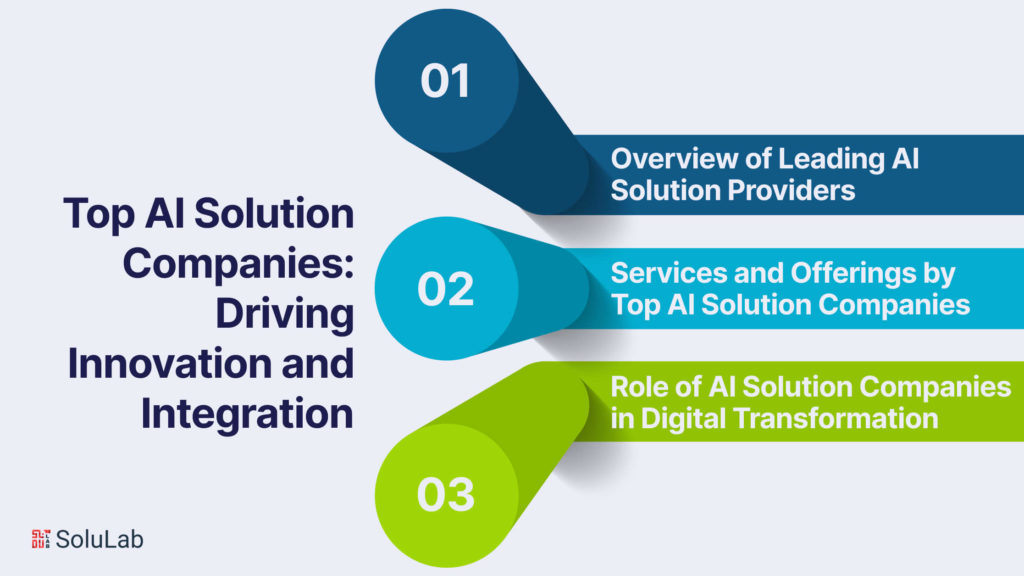
Amid the dynamic AI landscape, numerous top AI solution companies have emerged, leading the charge in driving innovation and integration. This segment highlights the services and offerings provided by these companies and their pivotal role in supporting businesses through digital transformation.
-
Overview of Leading AI Solution Providers
Several leading AI solution companies have emerged, offering a diverse range of AI-based products and services. These companies specialize in developing AI solutions tailored to specific industry requirements, including data analysis, automation, and predictive modeling. Some of the top AI solution companies include Google, Microsoft, IBM, Amazon Web Services (AWS), and Salesforce, among others.
-
Services and Offerings by Top AI Solution Companies
Top AI solution companies offer a wide array of services and offerings, including AI-powered data analytics, machine learning algorithms, natural language processing tools, and AI-driven automation solutions. These services cater to the specific needs of businesses, providing them with valuable insights, predictive analytics, and automation capabilities to streamline their operations and drive business growth. Additionally, AI solution companies offer consultancy services, training programs, and customized AI solutions to address complex business challenges and opportunities.
-
Role of AI Solution Companies in Digital Transformation
The role of AI solution companies in digital transformation is instrumental in driving innovation and integration across industries. These companies play a crucial role in helping businesses adopt and implement AI technologies, enabling them to leverage data-driven insights and automation to enhance their operational efficiency and competitiveness. By providing customized AI development solutions, consultancy services, and ongoing support, AI solution companies empower businesses to navigate the complexities of digital transformation and stay ahead in an increasingly competitive marketplace.
AI Consulting Companies: Navigating Businesses Through AI Integration
AI consulting companies are crucial in guiding businesses through the intricate process of AI integration. This section delves into the significance of AI consulting in organizational development and emphasizes the collaborative strategies adopted by businesses and consulting firms for successful AI implementation.
-
Importance of AI Consulting in Organizational Development
AI consulting companies play a vital role in guiding businesses through the process of AI integration and adoption. These consulting firms provide expert guidance and strategic insights to help businesses identify the right AI solutions and develop customized strategies for successful implementation. By understanding the unique requirements and challenges of each business, AI consulting companies offer tailored solutions that align with the organization’s objectives and goals, facilitating a seamless transition to AI-driven operations.
-
Leveraging Expertise from AI Consulting Companies
Businesses can leverage the expertise and knowledge of AI consulting companies to gain a deeper understanding of AI technologies, their potential applications, and their impact on business operations. These consulting firms offer comprehensive assessments, feasibility studies, and roadmaps for AI implementation, enabling businesses to make informed decisions and investments in AI solutions that best align with their long-term objectives. By collaborating with AI consulting companies, businesses can gain access to a pool of AI experts, data scientists, and industry specialists, ensuring a holistic approach to AI integration and development.
-
Collaborative Strategies for AI Implementation and Integration
AI consulting companies work collaboratively with businesses to develop and implement effective strategies for AI integration. These strategies encompass the identification of AI use cases, data collection and analysis, AI model development, and deployment, as well as ongoing monitoring and optimization. By fostering collaboration and communication between cross-functional teams, AI consulting companies facilitate the seamless integration of AI technologies into existing business processes, enabling businesses to achieve operational excellence, cost optimization, and enhanced decision-making capabilities.
Exploring the Landscape of AI Development Companies
AI development companies are at the forefront of AI innovation, contributing to the development and deployment of cutting-edge AI solutions. This segment provides an overview of these leading companies, their innovations, and their contributions to shaping future technologies.
-
Overview of Top AI Development Companies
AI development companies are at the forefront of AI innovation, driving the development and deployment of cutting-edge AI solutions across industries. These companies specialize in AI software development, algorithm design, and machine learning model development, catering to the diverse needs of businesses seeking to leverage AI for enhanced productivity, efficiency, and competitive advantage. Some of the top AI development companies include OpenAI, DeepMind, and UiPath, among others.
-
Innovations and Technologies by AI Development Companies
AI development companies are known for their innovative approaches to Artificial Intelligence technology, including advancements in natural language processing, computer vision, and reinforcement learning. These companies continuously strive to push the boundaries of AI research and development, exploring new techniques, algorithms, and models that can address complex business challenges and opportunities. By staying at the forefront of AI research, AI development companies contribute to the continuous evolution and advancement of AI technologies, fostering a culture of innovation and excellence.
-
AI Development Companies and the Shaping of Future Technologies
The contributions of AI development companies are instrumental in shaping the future of technology, as they continue to drive advancements in AI research, development, and deployment. These companies are actively involved in addressing the evolving needs and demands of businesses, offering tailored AI solutions that can optimize operations, enhance decision-making, and drive innovation. By collaborating with AI development companies, businesses can tap into a wealth of AI expertise and knowledge, gaining access to state-of-the-art AI technologies that can propel them toward sustainable growth and success.
Decoding the AI Revolution: Challenges and Opportunities
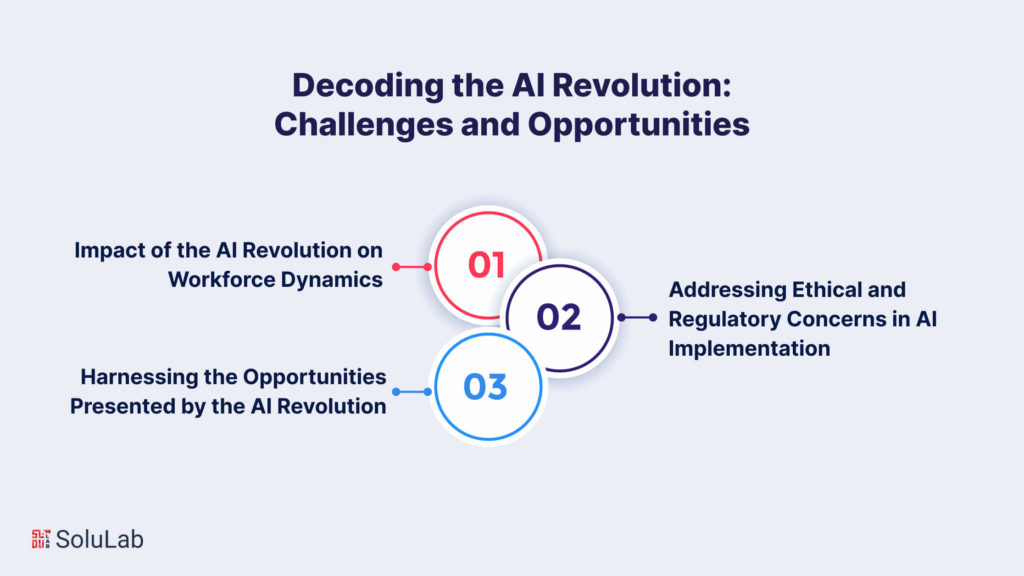
The AI revolution presents a myriad of challenges and opportunities for businesses, particularly in terms of workforce dynamics, ethical considerations, and harnessing the potential of AI technologies. This section sheds light on the implications of the Artificial Intelligence revolution and how businesses can navigate this transformative era.
-
Impact of the AI Revolution on Workforce Dynamics
The AI revolution has led to significant changes in workforce dynamics, impacting the nature of work, job roles, and skill requirements. As AI technologies continue to automate routine tasks and streamline business operations, there is a growing need for upskilling and reskilling the workforce to adapt to the changing demands of the digital era. While AI presents opportunities for increased efficiency and productivity, it also poses challenges related to job displacement, skill gaps, and workforce restructuring, necessitating a comprehensive approach to workforce development and management.
-
Addressing Ethical and Regulatory Concerns in AI Implementation
As AI technologies become more pervasive across industries, there is a growing need to address ethical and regulatory concerns related to data privacy, security, and bias in AI decision-making. Businesses and AI stakeholders must prioritize ethical considerations in AI development and deployment, ensuring that AI systems adhere to ethical guidelines and regulatory frameworks to protect user data and privacy. By implementing transparent and accountable AI practices, businesses can build trust and credibility with their stakeholders and foster responsible AI integration and usage.
-
Harnessing the Opportunities Presented by the AI Revolution
While the AI revolution presents challenges, it also offers numerous opportunities for businesses to innovate, grow, and thrive in an increasingly competitive marketplace. By embracing AI technologies, businesses can leverage data-driven insights, predictive analytics, and automation capabilities to streamline their operations, optimize their resources, and deliver enhanced customer experiences. The AI revolution also enables businesses to explore new market opportunities, develop innovative products and services, and expand their reach to new customer segments, driving sustainable growth and profitability in the digital age.
Enterprise AI Development Companies: Advancing Organizational Efficiency
In the quest for enhanced organizational efficiency, enterprise AI development companies play a pivotal role. This segment emphasizes the importance of these companies in optimizing enterprise-level operations and implementing AI solutions tailored to meet complex business challenges.
-
Role of Enterprise AI Development Companies in Business Optimization
Enterprise AI development companies play a critical role in advancing organizational efficiency by offering AI solutions and services tailored to the specific needs of enterprises. These companies focus on addressing complex business challenges, such as process automation, data analysis, and decision-making, by leveraging AI-driven technologies and applications. By partnering with enterprise AI development companies, businesses can optimize their operations, improve productivity, and achieve cost-effective solutions that drive business success and sustainability.
-
Implementing AI Solutions for Enterprise-Level Challenges
Enterprise AI development companies offer a comprehensive suite of AI solutions designed to address enterprise-level challenges and opportunities. These solutions encompass AI-driven data analytics, predictive modeling, intelligent automation, and cognitive computing, enabling businesses to make informed decisions, streamline their operations, and enhance their competitive edge. By integrating AI solutions, businesses can unlock valuable insights, mitigate risks, and capitalize on emerging opportunities, positioning themselves as industry leaders and innovators in their respective domains.
-
Driving Innovation and Scalability through Enterprise AI Development
Enterprise AI development companies are instrumental in driving innovation and scalability across industries, empowering businesses to explore new horizons and opportunities for growth. These companies specialize in developing scalable AI solutions that can adapt to the evolving needs and demands of enterprise-level operations, enabling businesses to achieve long-term sustainability and success. By harnessing the power of AI technologies, businesses can foster a culture of innovation, creativity, and agility, driving continuous improvement and transformation within their organizations.
Unveiling the Artificial Intelligence Model
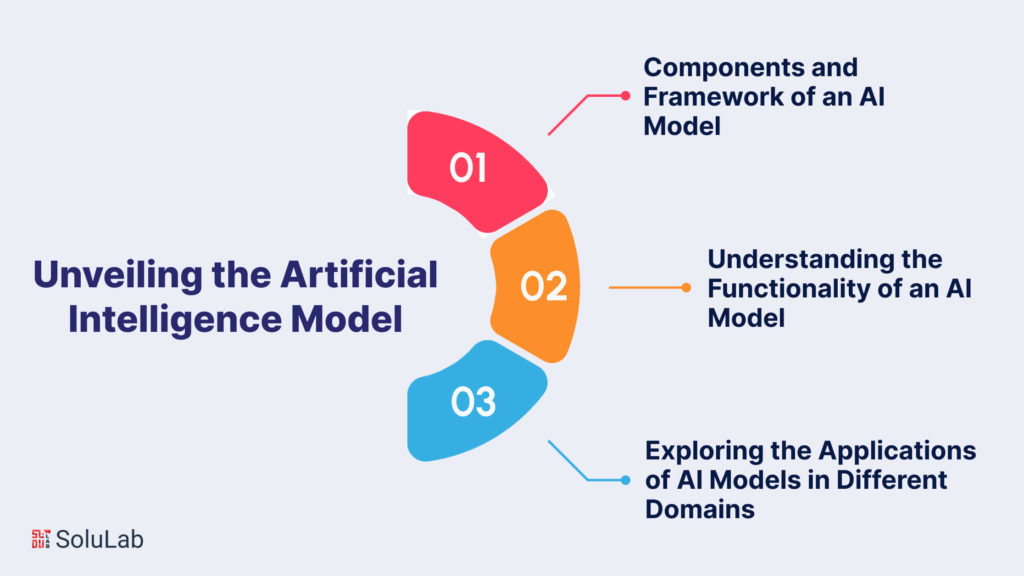
The artificial intelligence model serves as the backbone of AI operations, encompassing a diverse range of components and frameworks designed to simulate human intelligence. This section provides insights into the functionality of an Generative AI models and its applications across various domains.
-
Components and Framework of an Artificial Intelligence Model
The artificial intelligence model encompasses a set of interconnected components and frameworks designed to simulate human intelligence and cognitive functions. These components include data collection and preprocessing, algorithm development and training, model testing and validation, and deployment and optimization. The framework of an artificial intelligence model is structured to enable the seamless integration of data-driven insights and machine learning capabilities, facilitating the development of predictive models, recommendation systems, and decision-making tools that can enhance business performance and outcomes.
-
Understanding the Functionality of an AI Model
The functionality of an AI model revolves around its ability to process and analyze vast amounts of data, extract meaningful patterns and insights, and generate predictive outcomes and recommendations. AI models leverage sophisticated algorithms and machine learning techniques to learn from data, adapt to changing environments, and make intelligent decisions based on predefined objectives and criteria. By understanding the functionality of an AI model, businesses can harness the power of data-driven insights and automation to optimize their operations, enhance their decision-making capabilities, and drive sustainable growth and profitability.
-
Exploring the Applications of AI Models in Different Domains
AI models find applications in various domains, including finance, healthcare, manufacturing, and retail, among others. In finance, AI models are utilized for risk management, fraud detection, and algorithmic trading, enabling businesses to optimize their investment strategies and minimize financial risks. In healthcare, AI models support disease diagnosis, treatment planning, and patient care management, empowering healthcare professionals to deliver personalized and efficient healthcare services. Similarly, in manufacturing and retail, AI models facilitate supply chain optimization, inventory management, and demand forecasting, leading to improved operational efficiency and customer satisfaction.
Generative AI: A Catalyst for Innovation and Creativity
Generative AI has emerged as a catalyst for fostering innovation and creativity, enabling businesses to explore new dimensions of creative design and multimedia production. This segment explores the concept of generative AI, its emerging trends, and its transformative applications in different industries.
-
Understanding the Concept of Generative AI
Generative AI refers to a subset of artificial intelligence that focuses on creating and generating new content, such as images, text, and multimedia, based on existing data and patterns. Generative AI models utilize deep learning techniques, including generative adversarial networks (GANs) and variational autoencoders (VAEs), to generate realistic and creative outputs that mimic human creativity and imagination. By simulating human-like behaviors and cognitive processes, generative AI fosters innovation and creativity, enabling businesses to explore new possibilities and avenues for product development and design.
-
Emerging Trends and Applications of Generative AI
Generative AI is witnessing a surge in popularity across various industries, driven by its applications in creative design, content generation, and multimedia production. In the field of creative design, generative AI is used for generating realistic images, 3D models, and visual artwork, allowing designers and artists to explore new aesthetics and design concepts. In content generation, generative AI facilitates the development of personalized content, storytelling, and multimedia presentations, enhancing user engagement and brand storytelling. Additionally, in multimedia production, generative AI enables the creation of realistic animations, special effects, and virtual environments, enhancing the overall visual appeal and immersive experience for users and audiences.
-
Leveraging Generative AI for Innovative Use Cases
Businesses can leverage generative AI for innovative use cases, such as product design, virtual prototyping, and creative marketing campaigns, to foster innovation and differentiation in the marketplace. By incorporating generative AI tools and models, businesses can streamline their creative processes, accelerate product development cycles, and introduce novel concepts and designs that resonate with their target audience. Generative AI also empowers businesses to personalize user experiences, deliver interactive content, and create immersive virtual environments, fostering deeper engagement and emotional connections with their customers and stakeholders.
Exploring the Role of Generative AI in Shaping Future Technologies
Generative AI plays a crucial role in advancing data analysis, pattern recognition, and creative design capabilities, significantly impacting the trajectory of future technologies. This section highlights the implications of generative AI and its collaborative integration with existing technologies.
-
Role of Generative AI in Advanced Data Analysis and Pattern Recognition
Generative AI plays a critical role in advancing data analysis and pattern recognition capabilities, enabling businesses to extract meaningful insights, trends, and correlations from complex datasets. By leveraging generative AI models, businesses can analyze large volumes of structured and unstructured data, identify hidden patterns and anomalies, and derive actionable insights that drive strategic decision-making and business performance. Generative AI also facilitates predictive modeling, forecasting, and trend analysis, empowering businesses to make informed predictions and projections that support long-term planning and growth.
-
Implications of Generative AI in Creative Design and Multimedia Production
The implications of generative AI in creative design and multimedia production are far-reaching, as businesses increasingly rely on AI-driven tools and technologies to enhance their creative capabilities and storytelling techniques. Generative AI enables businesses to automate the design process, streamline content creation, and generate personalized multimedia experiences that resonate with their target audience. By harnessing generative AI, businesses can unlock new dimensions of creativity, aesthetics, and user engagement, fostering a culture of innovation and experimentation in their creative endeavors and multimedia productions.
-
Collaboration and Integration of Generative AI with Existing Technologies
The collaboration and integration of generative AI with existing technologies are essential for driving innovation and fostering a cohesive digital ecosystem that supports business growth and sustainability. Businesses can integrate generative AI tools and models with their existing AI infrastructure, data analytics platforms, and creative design software, enabling seamless data exchange and collaboration across different departments and teams. By fostering a collaborative environment, businesses can leverage the collective expertise and insights of AI specialists, data scientists, and creative professionals, fostering cross-functional collaboration and knowledge sharing that drive continuous improvement and excellence.
Conclusion
In conclusion, the evolution of Artificial Intelligence (AI) has ushered in a new era of technological advancement and innovation, redefining the way businesses operate and transforming various industries. The widespread adoption of AI-powered chatbots, the rise of top AI solution companies, and the pivotal role of AI consulting services have revolutionized the business landscape, paving the way for a more efficient and streamlined future.
Enterprise AI development companies have played a significant role in advancing organizational efficiency, providing tailored AI solutions to address complex business challenges and drive growth. The unveiling of the artificial intelligence model has provided businesses with a comprehensive framework to leverage data-driven insights and machine learning capabilities, propelling them towards optimized operations and enhanced decision-making.
Furthermore, the emergence of Generative AI as a catalyst for innovation and creativity has unlocked new dimensions of creative design and multimedia production. Generative AI trends and tools have empowered businesses to foster a culture of innovation, drive continuous improvement, and enhance customer experiences, thereby securing a competitive edge in the market.
Through strategic implementations and collaborative efforts with leading AI development companies like SoluLab, businesses can harness the full potential of AI technologies, drive sustainable growth, and differentiate themselves in an increasingly competitive landscape. By leveraging the expertise of dedicated AI developers and consulting services, businesses can navigate the complexities of the AI revolution, capitalize on emerging opportunities, and chart a successful path toward a more prosperous and technologically advanced future.
FAQs
1. What are the key benefits of integrating AI-powered chatbots into business operations?
The key benefits of integrating AI-powered chatbots into business operations include enhanced customer engagement, round-the-clock support, personalized interactions, and streamlined customer service operations.
2. How can businesses determine the right AI consulting services to meet their specific needs and objectives?
Businesses can determine the right AI consulting services by considering factors such as expertise, industry experience, tailored solutions, and a proven track record of successful AI integration and implementation.
3. What are the primary factors to consider when hiring dedicated AI developers for a project?
When hiring dedicated AI developers, businesses should consider factors such as technical proficiency, experience in AI development, adaptability to project requirements, and a collaborative approach to problem-solving.
4. How does Generative AI contribute to the enhancement of creative design and multimedia production?
Generative AI contributes to the enhancement of creative design and multimedia production by enabling automated design processes, personalized content generation, and the creation of immersive virtual environments that resonate with audiences.
5. What are the potential ethical implications and challenges associated with the widespread adoption of AI technologies?
The widespread adoption of AI technologies raises ethical implications and challenges related to data privacy, security, and bias. Businesses must prioritize transparent and accountable AI practices to build trust and credibility with stakeholders.
6. How can businesses effectively leverage the capabilities of the artificial intelligence model to optimize their decision-making processes?
Businesses can effectively leverage the capabilities of the artificial intelligence model by harnessing data-driven insights, predictive analytics, and automation to optimize their operations, enhance decision-making, and drive sustainable growth.
7. What are the emerging trends in AI development and how do they impact the future of various industries?
Emerging trends in AI development impact the future of various industries by enabling advanced data analysis, pattern recognition, and creative design solutions that drive innovation, efficiency, and competitiveness across different domains.






